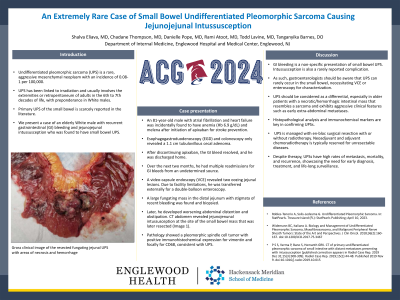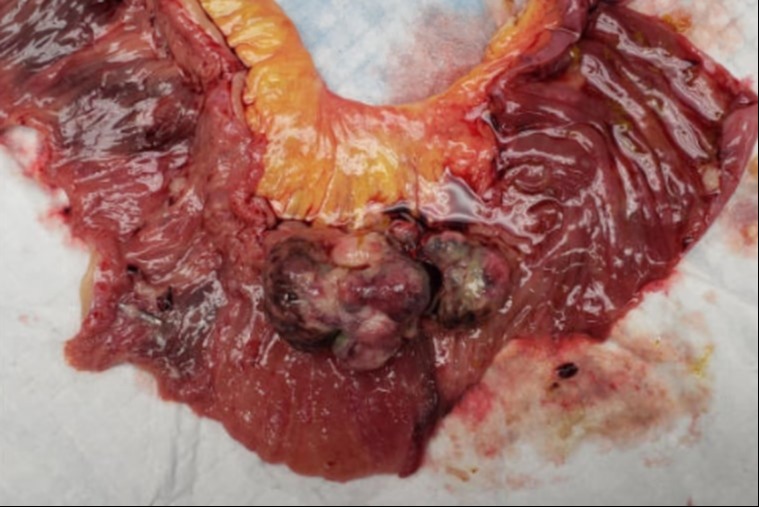Monday Poster Session
Category: Small Intestine
P3292 - An Extremely Rare Case of Small Bowel Undifferentiated Pleomorphic Sarcoma Causing Jejunojejunal Intussusception
Monday, October 28, 2024
10:30 AM - 4:00 PM ET
Location: Exhibit Hall E

Has Audio

Shalva Eliava, MD
Englewood Hospital and Medical Center
Englewood, NJ
Presenting Author(s)
Shalva Eliava, MD1, Chadane Thompson, MD1, Danielle Pope, MD2, Rami Atoot, MD1, Todd Lavine, MD1, Tanganyika Barnes, DO1
1Englewood Hospital and Medical Center, Englewood, NJ; 2Englewood Hospital and Medical Center, Bogota, NJ
Introduction: Undifferentiated pleomorphic sarcoma (UPS) is a rare, aggressive mesenchymal neoplasm with an incidence of 0.08-1 per 100,000. UPS has been linked to irradiation and usually involves the extremities or retroperitoneum of adults in the 6th to 7th decades of life, with preponderance in White males. Primary UPS of the small bowel is scarcely reported in the literature. We present a case of an elderly White male with recurrent gastrointestinal (GI) bleeding and jejunojejunal intussusception who was found to have small bowel UPS.
Case Description/Methods: An 81-year-old male with atrial fibrillation and heart failure was incidentally found to have anemia (Hb 6.9 g/dL) and melena after initiation of apixaban for stroke prevention. Esophagogastroduodenoscopy (EGD) and colonoscopy only revealed a 1.1 cm tubulovillous cecal adenoma. After discontinuing apixaban, the GI bleed resolved, and he was discharged home. Over the next two months, he had multiple readmissions for GI bleeds from an undetermined source. A video-capsule endoscopy (VCE) revealed two oozing jejunal lesions. Due to facility limitations, he was transferred externally for a double-balloon enteroscopy. A large fungating mass in the distal jejunum with stigmata of recent bleeding was found and biopsied. Later, he developed worsening abdominal distention and obstipation. CT abdomen revealed jejunojenunal intussusception at the site of the small bowel mass that was later resected (Image 1). Pathology showed a pleomorphic spindle cell tumor with positive immunohistochemical expression for vimentin and focally for CD68, consistent with UPS.
Discussion: GI bleeding is a non-specific presentation of small bowel UPS. Intussusception is also a rarely reported complication. As such, gastroenterologists should be aware that UPS can rarely occur in the small bowel, necessitating VCE or enteroscopy for characterization. UPS should be considered as a differential, especially in older patients with a necrotic/hemorrhagic intestinal mass that resembles a sarcoma and exhibits aggressive clinical features such as early extra-abdominal metastases. Histopathological analysis and immunochemical markers are key in confirming UPSs. UPS is managed with en-bloc surgical resection with or without radiotherapy. Neoadjuvant and adjuvant chemoradiotherapy is typically reserved for unresectable diseases. Despite therapy, UPSs have high rates of metastasis, mortality, and recurrence, showcasing the need for early diagnosis, treatment, and life-long surveillance.

Disclosures:
Shalva Eliava, MD1, Chadane Thompson, MD1, Danielle Pope, MD2, Rami Atoot, MD1, Todd Lavine, MD1, Tanganyika Barnes, DO1. P3292 - An Extremely Rare Case of Small Bowel Undifferentiated Pleomorphic Sarcoma Causing Jejunojejunal Intussusception, ACG 2024 Annual Scientific Meeting Abstracts. Philadelphia, PA: American College of Gastroenterology.
1Englewood Hospital and Medical Center, Englewood, NJ; 2Englewood Hospital and Medical Center, Bogota, NJ
Introduction: Undifferentiated pleomorphic sarcoma (UPS) is a rare, aggressive mesenchymal neoplasm with an incidence of 0.08-1 per 100,000. UPS has been linked to irradiation and usually involves the extremities or retroperitoneum of adults in the 6th to 7th decades of life, with preponderance in White males. Primary UPS of the small bowel is scarcely reported in the literature. We present a case of an elderly White male with recurrent gastrointestinal (GI) bleeding and jejunojejunal intussusception who was found to have small bowel UPS.
Case Description/Methods: An 81-year-old male with atrial fibrillation and heart failure was incidentally found to have anemia (Hb 6.9 g/dL) and melena after initiation of apixaban for stroke prevention. Esophagogastroduodenoscopy (EGD) and colonoscopy only revealed a 1.1 cm tubulovillous cecal adenoma. After discontinuing apixaban, the GI bleed resolved, and he was discharged home. Over the next two months, he had multiple readmissions for GI bleeds from an undetermined source. A video-capsule endoscopy (VCE) revealed two oozing jejunal lesions. Due to facility limitations, he was transferred externally for a double-balloon enteroscopy. A large fungating mass in the distal jejunum with stigmata of recent bleeding was found and biopsied. Later, he developed worsening abdominal distention and obstipation. CT abdomen revealed jejunojenunal intussusception at the site of the small bowel mass that was later resected (Image 1). Pathology showed a pleomorphic spindle cell tumor with positive immunohistochemical expression for vimentin and focally for CD68, consistent with UPS.
Discussion: GI bleeding is a non-specific presentation of small bowel UPS. Intussusception is also a rarely reported complication. As such, gastroenterologists should be aware that UPS can rarely occur in the small bowel, necessitating VCE or enteroscopy for characterization. UPS should be considered as a differential, especially in older patients with a necrotic/hemorrhagic intestinal mass that resembles a sarcoma and exhibits aggressive clinical features such as early extra-abdominal metastases. Histopathological analysis and immunochemical markers are key in confirming UPSs. UPS is managed with en-bloc surgical resection with or without radiotherapy. Neoadjuvant and adjuvant chemoradiotherapy is typically reserved for unresectable diseases. Despite therapy, UPSs have high rates of metastasis, mortality, and recurrence, showcasing the need for early diagnosis, treatment, and life-long surveillance.

Figure: Image 1: Gross clinical image of the resected fungating jejunal UPS with areas of necrosis and
hemorrhage
hemorrhage
Disclosures:
Shalva Eliava indicated no relevant financial relationships.
Chadane Thompson indicated no relevant financial relationships.
Danielle Pope indicated no relevant financial relationships.
Rami Atoot indicated no relevant financial relationships.
Todd Lavine indicated no relevant financial relationships.
Tanganyika Barnes indicated no relevant financial relationships.
Shalva Eliava, MD1, Chadane Thompson, MD1, Danielle Pope, MD2, Rami Atoot, MD1, Todd Lavine, MD1, Tanganyika Barnes, DO1. P3292 - An Extremely Rare Case of Small Bowel Undifferentiated Pleomorphic Sarcoma Causing Jejunojejunal Intussusception, ACG 2024 Annual Scientific Meeting Abstracts. Philadelphia, PA: American College of Gastroenterology.
